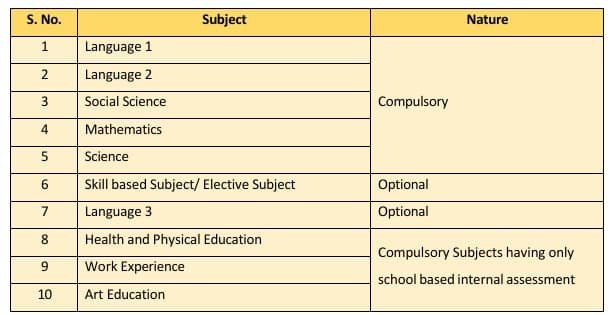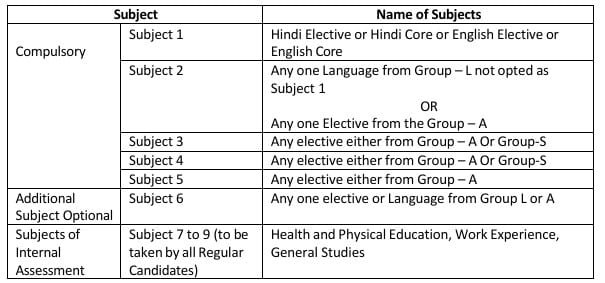The CBSE Academic is a national-level board of education in India. CBSE was established in 1929 by the Indian government and is responsible for regulating and managing secondary education. CBSE has approx. 27000 affiliated schools in India and 240 schools in other countries. The aim of the CBSE is to provide quality education and promote intellectual, social, and cultural development among the students.
CBSE Academic Notes and Support Material
Class 9 Subject
Math
Notes & Q/A
Science
Physics, Chem, Bio
Social Science
History, Civics
English
Grammar & Lit
Computer
Notes & Practicals

Class IX & X Subjects offered by CBSE Academic

- Language Subject: Arabic, Assamese, Bahasa Melayu, Bengali, Bhoti, Bhutia, Bodo, English Language and Literature, English Communicative, French, German, Gujarati, Gurung, Hindi Course-A, Hindi Course-B, Japanese, Kannada, Kashmiri, Kokborok, Lepcha, Limboo, Malayalam, Manipuri, Marathi, Mizo, Nepali, Odia, Persian, Punjabi, Rai, Russian, Sanskrit, Sanskrit Communicative, Sindhi, Spanish, Sherpa, Tamang, Tamil, Tangkhul, Telugu AP, Telugu Telangana, Tibetan, Thai, Urdu Course A, and Urdu Course B.
- Main Subject: Mathematics, Science, Social Science
- Other Academic Electives Subject: Carnatic Music (Vocal), Carnatic Music (Melodic Instruments), Carnatic Music (Percussion Instruments), Hindustani Music (Vocal), Hindustani Music (Melodic Instruments), Hindustani Music (Percussion Instruments), Painting, Home Science, National Cadet Corps (NCC), Computer Applications, Elements of Business, and Elements of Bookkeeping and Accountancy.
- Internal Assessment: Health and Physical Education, Work Experience, Art Education
Class XI & XII Subjects Offered by CBSE Academic

- Language Subject: Arabic, Assamese, Bengali, Bhoti, Bhutia, Bodo, French, German, Gujarati, Hindi Core, Hindi Elective, English Core, English Elective, Japanese, Kannada, Kashmiri, Kokborok, Lepcha, Limboo, Malayalam, Manipuri, Marathi, Mizo, Nepali, Odia, Persian, Punjabi, Russian, Sanskrit Core, Sanskrit Elective, Sindhi, Spanish, Tamil, Tangkhul, Telugu AP, Telugu Telangana, Tibetan, Urdu Core, and Urdu Elective.
- Academic Electives Subject: Accountancy, Biology, Biotechnology, Business Studies, Carnatic Melodic, Carnatic Vocal, Carnatic Percussion, Chemistry, Computer Science, Economics, Engineering Graphics, Entrepreneurship, Fine Arts, Dance, Geography, Hindustani Melodic, Hindustani Percussion, Hindustani Vocal, History, Home Science, Informatics Practices, Knowledge Tradition – Practices India, Legal Studies, Mathematics, Applied Mathematics, NCC, Physical Education, Physics, Political Science, Psychology, Sociology.
- Internal Assessment: Health and Physical Education, Work Experience, General Studies
The CBSE is implementing the New Education Policy (NEP) 2020 with new structure, training programs, and curriculum reforms. The new pedagogical structure introduced, this system replaces the old system of 10+2 and brings a new system of the 5+3+3+4 model. CBSE has adopted the NCF-FS 2022 and introduced the foundational stage from Balvatika to Class II from the session 2023-24.
CBSE is also providing online training modules and content for the teachers; over 120,000 teachers are registered, and 75,656 are trained in the Foundational Literacy and Numeracy program. CBSE has also created the microsite and question bank to support the Foundational Literacy and Numeracy program. CBSE is also working on the National Curriculum Framework for School Education (NCF-SE 2023) to ensure that the syllabus, pedagogy, and assessments are done as per the NEP goals.
Multiple theme-based webinars were organized after the launch of NEP 2020. The main focus of the webinar was organized. These webinars focused on innovative teaching and learning processes and NEP’s vision for holistic education. The main focus areas of NEP 2020 in CBSE schools are holistic and multidisciplinary education, skill development, assessment reforms, flexibility in subject choices, and technology integration. This will help the students to experience less exam stress and more conceptual learning. Teachers will also get structured training and modern pedagogical tools.
Key Highlights of the CBSE Academic Circular Aff-08/2023 (Implementation of National Curriculum Framework for Foundation Stage – 2022 from the Academic Session 2023-24-reg)
https://www.cbse.gov.in/cbsenew/documents/NCFFS_Circular_17032023.pdf
https://ncf.ncert.gov.in/webadmin/assets/b27f04eb-65af-467f-af12-105275251546
- New Structure: 5 years at the foundational stage from nursery to Class II, ages 3 to 8.
- NCF-FS 2022, the National Curriculum Framework for the Foundational Stage, which will guide the school on what to teach, how to teach, and how to access the foundational stage.
- Focus on competencies and learning outcomes. Children should understand concepts, not only memorize them. More focus on literacy, numeracy, play-based learning, and creativity.
- The framework includes practical examples to make teaching easier.
- If the school is running pre-primary then they have to continue with 3 years of pre-primary.
- There are no changespre-primary, in teachers’ qualifications; they are the same as per the NCTE notification (2014).
- CBSE Academic has given academic guidelines in the curriculum document for the 2023-24 academic year.
What is the National Curriculum Framework?
The National Curriculum Framework (NCF) guiding documents for school education are based on what students should learn, how they should be taught, and how learning should be accessed, ensuring that education across the country follows common goals and standards. The National Curriculum Framework for School Education (NCF) is developed based on the vision of the National Education Policy (NEP) 2020. The NCF focused on the age group of 3 to 18 years. The NCF focused on the 5+3+3+4 curricular and pedagogical restructuring of school education.
What are the main points of the National Education Policy 2020?
New Curriculum Structure: 5+3+3+4 model replacing the old system of 10+2. Holistic development: all subjects are important, like arts, science, language, vocational and extracurricular activities, Focused on the foundational literacy and numeracy mission, teacher training and recruitment, and early childhood care and education (ECCE).
What is the meaning of 5-3-3-4 in the new education policy?
- 5 years (Foundational Stage): Nursery to Class II (ages 3–8).
- 3 years (Preparatory Stage): Classes III–V (ages 8–11).
- 3 years (Middle Stage): Classes VI–VIII (ages 11–14).
- 4 years (Secondary Stage): Classes IX–XII (ages 14–18).
What are the benefits of NEP 2020 for students?
Students can select subjects based on their interests or streams; vocational courses will be introduced early, with competency-based assessments instead of rote memorization. Encourage the learner to learn in their mother tongue plus another language.
What are the main goals of education?
Access, equity, quality, affordability, accountability, literacy, and numeracy for all, Promote multilingualism & cultural awareness, critical thinking, creativity, and problem solving, and make India a global knowledge superpower.
What is the three-language formula in NEP 2020?
TLF, the Three Language Formula, refers to the policy that every student has to learn three languages in school; two languages will be Indian native languages. The NEP says that there is greater flexibility for choosing a language depending on the state, region, or student decision. The NEP also says that the mother tongue, home language, or local language be used as the medium of instruction at least until Grade 5.
